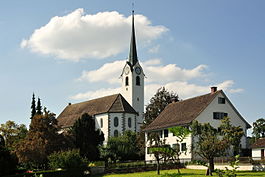Hombrechtikon
| Hombrechtikon | ||
|---|---|---|
 |
||
|
||
| Coordinates: 47°15′N 8°46′E / 47.250°N 8.767°ECoordinates: 47°15′N 8°46′E / 47.250°N 8.767°E | ||
| Country | Switzerland | |
| Canton | Zurich | |
| District | Meilen | |
| Area | ||
| • Total | 12.18 km2 (4.70 sq mi) | |
| Elevation | 464 m (1,522 ft) | |
| Population (Dec 2015) | ||
| • Total | 8,463 | |
| • Density | 690/km2 (1,800/sq mi) | |
| Postal code | 8634 | |
| SFOS number | 0153 | |
| Localities | Feldbach | |
| Surrounded by | Bubikon, Freienbach (SZ), Grüningen, Jona (SG), Oetwil am See, Rapperswil (SG), Stäfa | |
| Website |
www SFSO statistics |
|
Hombrechtikon is a municipality in the district of Meilen in the canton of Zürich in Switzerland.
Hombrechtikon is first mentioned in 1200 as Humbrechtigkon. In 1217 it was mentioned as Hunbrechticon.
Hombrechtikon has an area of 12.2 km2 (4.7 sq mi). Of this area, 60.6% is used for agricultural purposes, while 14.9% is forested. Of the rest of the land, 18.7% is settled (buildings or roads) and the remainder (5.8%) is non-productive (rivers, glaciers or mountains). In 1996[update] housing and buildings made up 13.9% of the total area, while transportation infrastructure made up the rest (4.8%). Of the total unproductive area, water (streams and lakes) made up 1.2% of the area. As of 2007[update] 15.8% of the total municipal area was undergoing some type of construction.
The municipality is located between Lake Zurich and the Zürcher Oberland. The land is very hilly, which prevented a large, single village from forming. There at least 97 different hamlets and individual farm houses scattered throughout the municipality. Some of the largest are Lützelsee (first mentioned in 745 as Lucikinse) and Feldbach (first mentioned in 873 as Velepach).
Hombrechtikon has a population (as of 31 December 2015) of 8,463. As of 2007[update], 16.7% of the population was made up of foreign nationals. As of 2008[update] the gender distribution of the population was 49.2% male and 50.8% female. Over the last 10 years the population has grown at a rate of 11.6%. Most of the population (as of 2000[update]) speaks German (88.9%), with Italian being second most common ( 2.4%) and Albanian being third ( 1.7%).
...
Wikipedia



